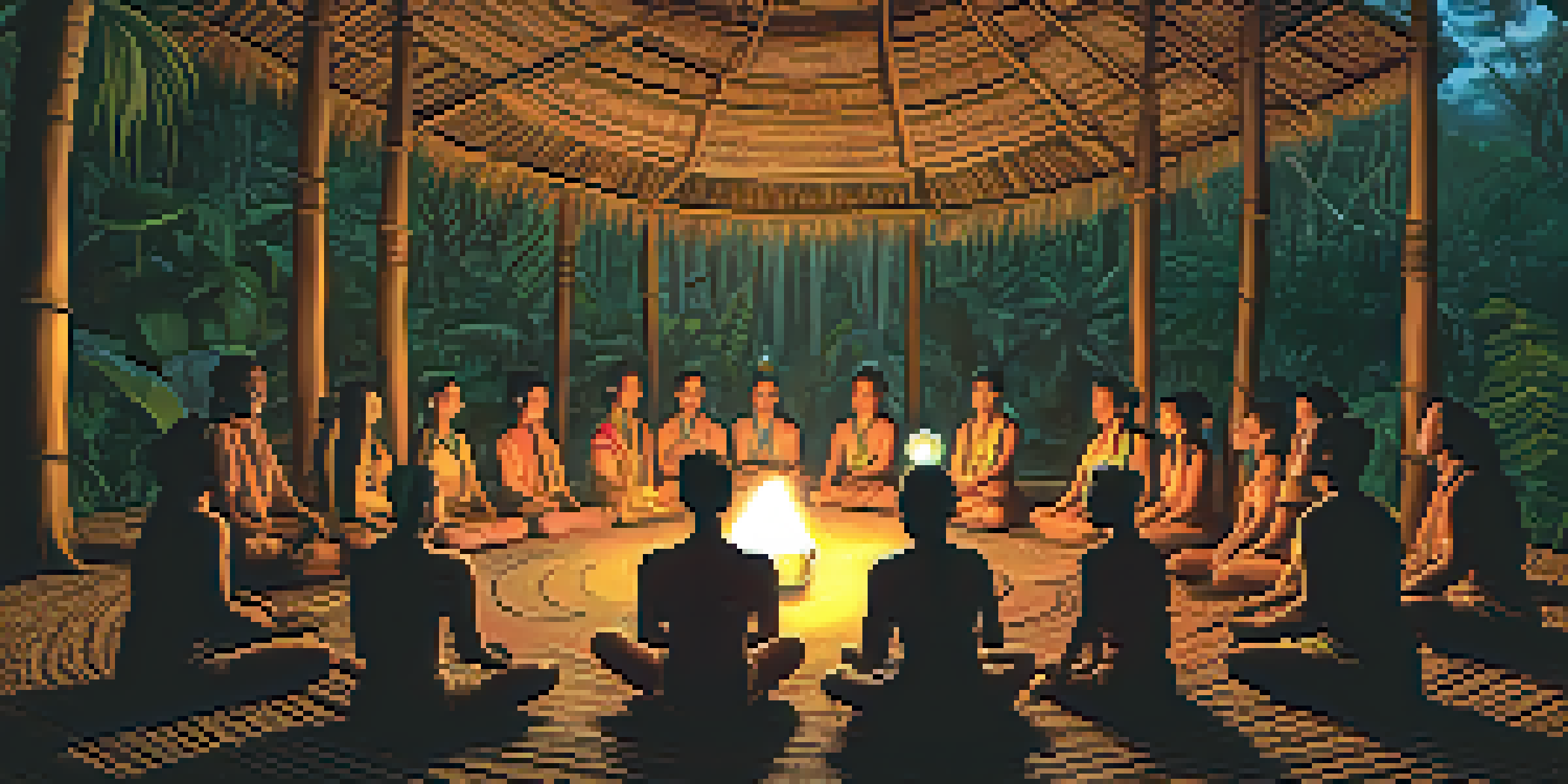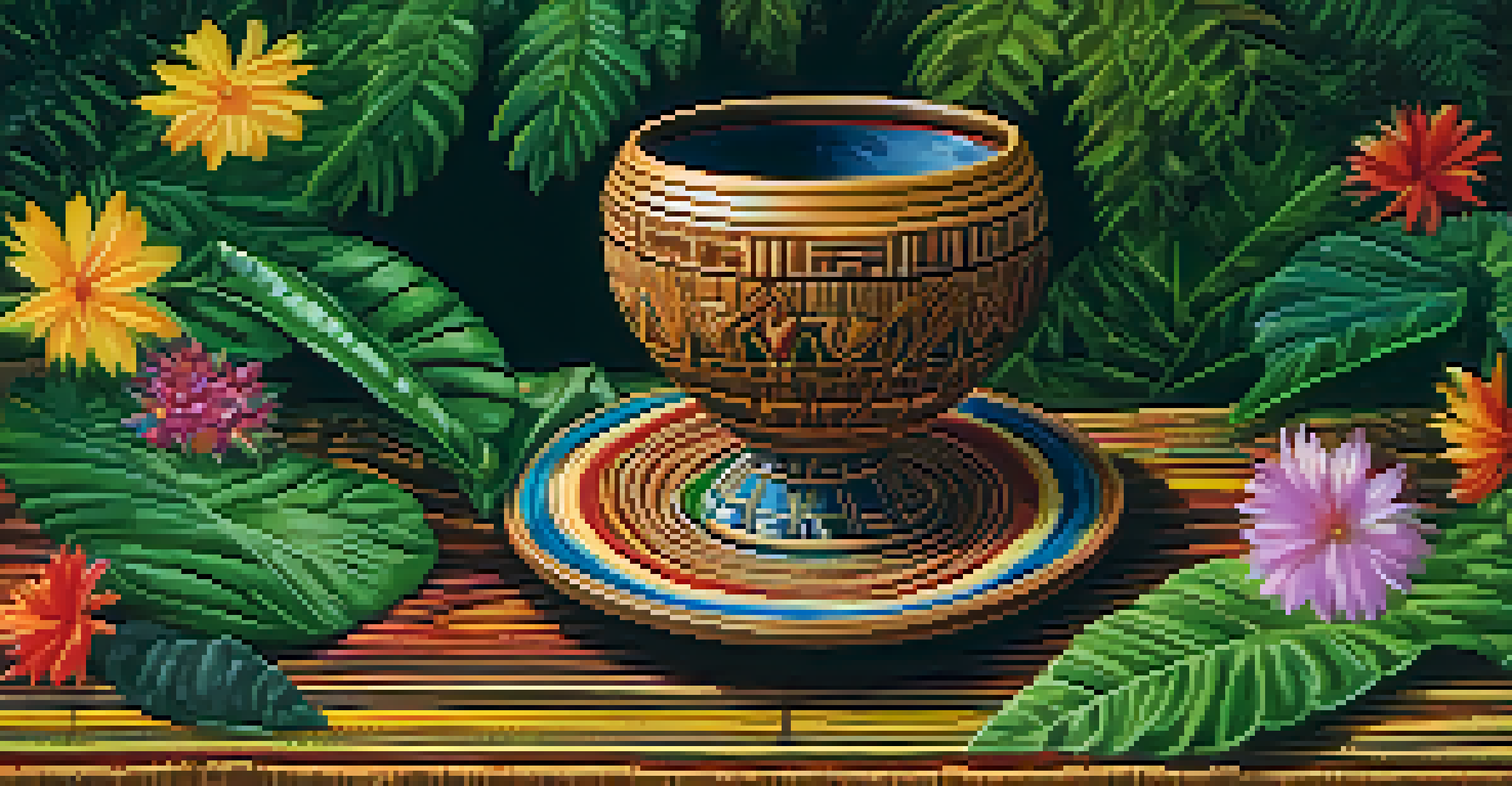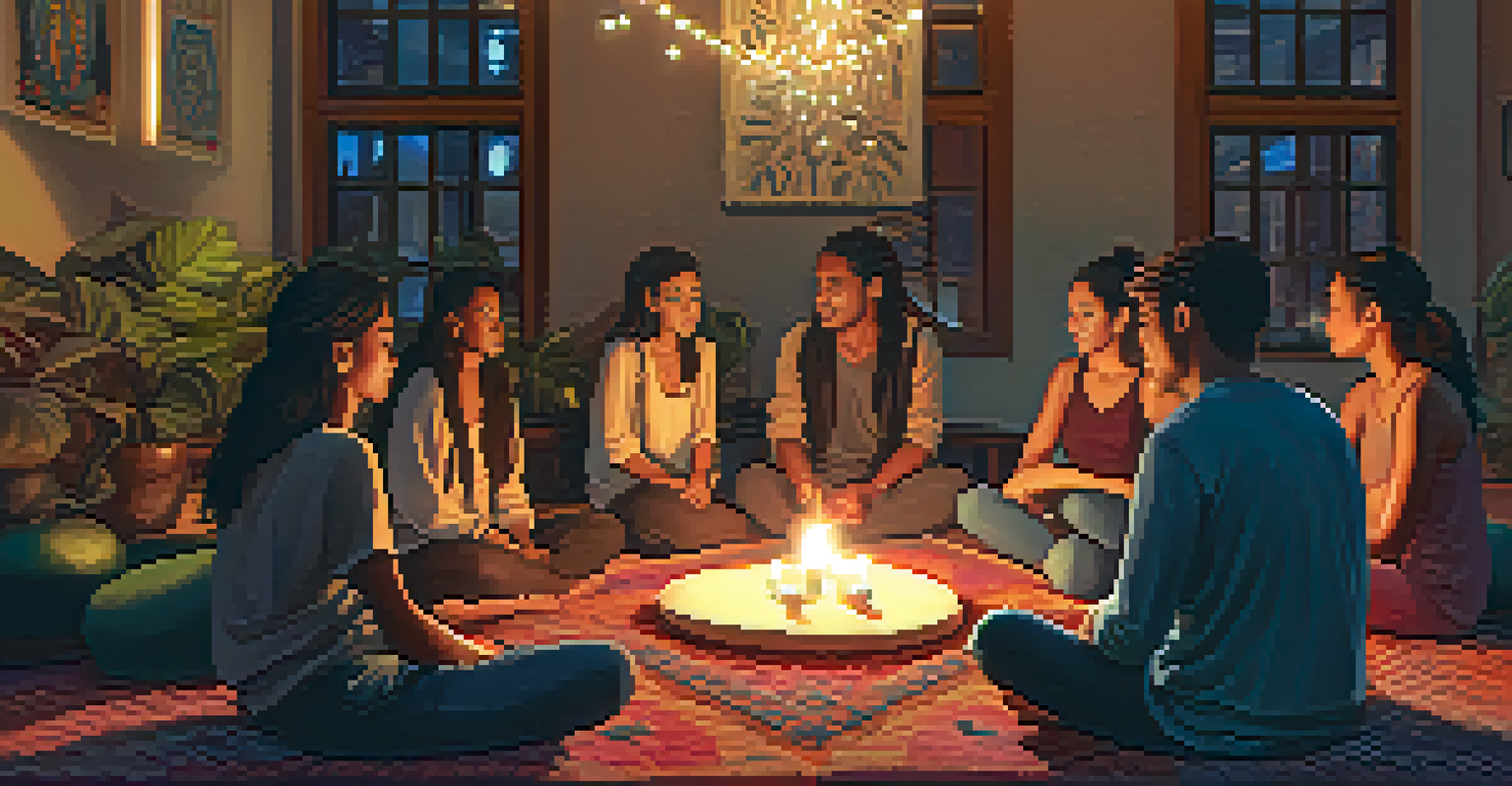The Role of Ritual in Ayahuasca: A Psychological Perspective

Understanding Ayahuasca and Its Cultural Significance
Ayahuasca, a powerful brew made from Amazonian plants, has gained popularity for its psychoactive effects. Traditionally used in indigenous rituals, it plays a pivotal role in healing and spiritual growth. Understanding its cultural backdrop is essential to appreciate how rituals enhance the overall experience.
The medicine heals, but the ritual is what makes it sacred.
In these cultures, ayahuasca is not just a substance; it’s a sacred tool for connection with the spiritual realm. The rituals surrounding its consumption often involve music, chanting, and community participation, which help participants feel supported and safe. This cultural context sets the stage for profound psychological exploration.
As we delve into the psychological perspective, it’s crucial to recognize how these rituals contribute to the mental and emotional outcomes of participants. The structured environment created by rituals fosters trust and openness, essential for navigating the often intense inner journeys that ayahuasca can provoke.
The Psychological Benefits of Ritual in Ayahuasca Ceremonies
Rituals in ayahuasca ceremonies serve as a psychological framework, providing participants with a sense of safety and predictability. This structure can significantly reduce anxiety, allowing individuals to immerse themselves fully in their experiences. The familiar patterns of ritual can create a comfort zone, making the unknown aspects of the journey less daunting.

Moreover, rituals can enhance the feelings of community and belonging. Participants often share their experiences, creating bonds that can lead to collective healing. This shared experience can amplify the psychological benefits, as individuals feel supported by their peers during vulnerable moments.
Rituals Foster Psychological Safety
Rituals in ayahuasca ceremonies create a structured and supportive environment, reducing anxiety and enhancing participants' exploration of their inner experiences.
As participants engage in these rituals, they often report deeper insights and emotional releases. The ceremonial aspects—like singing Icaros (traditional songs) or the presence of a shaman—can facilitate emotional catharsis, helping individuals confront and process trauma that may have surfaced during their journey.
Rituals as Catalysts for Transformation
Rituals can act as catalysts for personal transformation during ayahuasca sessions. By providing a structured environment, they encourage participants to explore their innermost thoughts and feelings in a supportive space. This exploration can lead to significant shifts in perspective, self-awareness, and emotional healing.
Rituals provide a sense of belonging and community, essential for healing.
For many, the ritualistic components—such as setting intentions before the ceremony—help direct their focus. This intentional preparation primes participants to confront specific issues, making the experience more meaningful and impactful. It’s like setting the stage for a play; the clearer the vision, the more powerful the performance.
As individuals integrate their experiences post-ceremony, the rituals they engaged in can provide a framework for understanding and applying their insights. This process of integration is crucial for lasting change, helping participants transform their newfound knowledge into actionable steps in their daily lives.
The Role of the Shaman in Ritual and Psychological Safety
The shaman, or curandero, plays a vital role in facilitating the ayahuasca experience, guiding participants through the rituals. Their presence often instills a sense of psychological safety, which is essential for navigating the depths of one’s psyche. Shamans are trained to create a protective environment, allowing individuals to feel secure as they confront challenging emotions or memories.
During the ceremony, the shaman utilizes various tools—like Icaros and sacred herbs—to enhance the ritual's effects. This not only deepens the participants' experience but also reinforces their connection to the ceremonial aspects of ayahuasca. The shaman’s guidance can help individuals interpret their experiences, providing insight that may not be immediately apparent.
Community Enhances Healing Processes
The communal aspect of ayahuasca rituals fosters a sense of belonging and interconnectedness, amplifying the psychological benefits through shared vulnerability.
Furthermore, the relationship between the shaman and the participants often fosters trust, which is crucial for psychological exploration. When individuals feel safe and supported by an experienced guide, they are more likely to open up and engage with their inner processes, leading to more profound healing and self-discovery.
Community Rituals and Their Psychological Impact
Participating in group rituals during ayahuasca ceremonies can significantly enhance the psychological effects of the experience. The communal aspect fosters a sense of shared vulnerability, helping individuals feel less isolated in their struggles. This collective energy can amplify the healing process, as participants support each other through their journeys.
Moreover, the shared rituals—such as group singing or collective intentions—create a powerful bond among participants. This sense of unity can lead to a feeling of interconnectedness, which is often transformative. It reminds individuals that they are not alone in their experiences, promoting a sense of belonging and acceptance.
As participants witness each other's journeys, they often gain new perspectives on their own challenges. The communal sharing of insights can spark inspiration and motivation, encouraging individuals to embrace their healing journeys with renewed vigor. This psychological reinforcement can be vital in sustaining the positive changes initiated during the ceremony.
Integrating Ayahuasca Insights Through Ritual
Integrating the insights gained from ayahuasca experiences often involves ongoing rituals beyond the ceremony itself. This might include personal practices such as meditation, journaling, or attending integration circles. These rituals help individuals make sense of their experiences and apply the lessons learned in their daily lives.
For many, the act of creating personal rituals around their ayahuasca insights can solidify the transformation. Whether it’s lighting a candle during meditation or using specific affirmations, these practices reinforce the psychological shifts initiated during the ceremony. It’s akin to planting seeds; with care and attention, they can grow into lasting change.
Integration Rituals Sustain Change
Ongoing personal and community rituals after ayahuasca ceremonies help individuals integrate their insights, reinforcing the psychological shifts for lasting transformation.
Furthermore, community integration rituals, such as sharing experiences with fellow participants, can provide additional support. These gatherings allow individuals to reflect on their journeys and continue the healing process collectively. The ongoing nature of these rituals underscores the importance of community in maintaining psychological well-being post-ayahuasca.
Conclusion: The Interplay of Ritual and Psychology in Ayahuasca
In summary, the role of ritual in ayahuasca experiences is deeply intertwined with psychological well-being. Rituals provide a structured environment that enhances feelings of safety, belonging, and support, which are crucial for exploring the psyche. The transformative power of these rituals can lead to significant emotional and psychological shifts.
As participants navigate their inner landscapes, the rituals guide them, offering a framework for understanding and integration. This interplay of ritual and psychology not only enriches the experience but also fosters lasting change in individuals' lives. The impact of these ceremonies extends far beyond the immediate experience, shaping how individuals approach their personal journeys.

Ultimately, embracing the role of ritual in ayahuasca can enhance the overall experience, allowing for deeper healing and transformation. As more people seek out ayahuasca for its psychological benefits, understanding the importance of ritual can help maximize its potential for positive change in their lives.